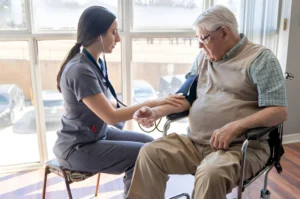Home health aides (HHAs) play a very important role in the healthcare system. They assist individuals who need extra support with their daily tasks due to age, illness, or disability. Generally, home health aides work in private homes, home health aide agencies, assisted living facilities, and other health care settings.
They ensure that patients receive the care and attention they need to live the best quality of life. As a result, a home health aide’s duties extend beyond just physical assistance. Thus, in the following blog, we talk about all the types of duties and responsibilities of a home health aide.
What Are the Primary Home Health Aide Duties and Responsibilities?
When it comes to helping patients, home health aides have a number of duties and responsibilities. Some of the primary ones are:
Personal Care Assistance
Home health aides provide their patients with personal care assistance such as grooming, bathing, dressing, and other similar tasks. This is to ensure that patients are always in a properly hygienic condition. It will prevent chances of infection and maintain their well-being. It will also help patients to feel comfortable in their daily lives.
Mobility and Transfer Support
Home health aides also help their patients to move around their houses with ease and topmost safety. They use mobility aids such as wheelchairs or walkers to help the patients. Not only this, but home health aides also help their patients to get in and out of bed.
They also promote and implement fall prevention strategies. This is done by making sure all the walking paths in a patient’s home are clear so they can walk around safely.
Vital Sign Monitoring
Vital sign monitoring is one of the important duties of a home health aide. During their training program, aides are taught how to check as well as record vital signs. This includes things such as body temperature, pulse, and blood pressure.
Home health aides also promptly report to medical professionals in case they detect any health issues. As a result, regular monitoring will prevent their condition from worsening.
Companionship and Emotional Support
Another essential part of a home health aide’s role is to provide emotional support to their patients through companionship. This plays a huge role in preventing loneliness and depression, especially among elderly patients.
Home health aides achieve this by initiating activities such as gaming, reading, or going on short walks. In the long run, all of these largely promote their mental and emotional well-being.
Additional Home Health Aide Duties and Responsibilities
Besides the duties mentioned above, home health aides have more responsibilities, especially in the field of specialized care. They are mainly designed for patients who have specific medical needs. So, some of these additional caregiving duties are:
Alzheimer’s and Dementia Care
Home health aides offer Alzheimer’s and dementia care by providing structured routines, memory exercises, and emotional support. This is to help patients who have cognitive impairments. Home health aides also help to manage any sudden behavioral changes such as agitation or confusion. They achieve this through calming techniques.
Post-surgery and Rehabilitation Assistance
They also help patients by providing them with physical therapy exercises. Home health aides make sure that post-surgical care instructions are being followed. This includes helping with wound care, monitoring patients for signs of infection, as well as mobility support to aid recovery.
Specialized Nutrition and Feeding Support
Another specialized duty of home health care is to provide proper meal preparation through appropriate feeding techniques. This is very important as there are patients with medical conditions like diabetes that have strict dietary restrictions.
Communication Skills and Documentation Responsibilities
Two of the key skills that a home health aide should have are communication and documentation. This is because their responsibilities include:
Communicating with Patients and Families
Home health aides need to update families on a patient’s condition constantly. They also need to address any noticeable concerns as well as educate their family members on caregiving techniques. As a result, they should be able to communicate to ensure family members stay informed and confident clearly.
Recognizing and Reporting Health Changes
Another thing that home health aides must do is document and report any health changes to medical professionals. This includes any physical or behavioral changes such as fluctuation in mood, weight loss, or any unusual symptoms. Properly documented health reports will lead to timely medical intervention and result in better patient health.
Workplace Environment
Home health aides work in a variety of work environments. The majority of them tend to work at either patient homes or any residential facilities. However, in terms of workplace environment, here are some of the things home health aides can expect:
- Home health aides need to deal with basic medical equipment that will help them assist patients, like taking their vital signs or helping them move around.
- Physical work is unavoidable for home health aides. Especially with mobility assistance, they may need to move patients in and out of bed or help them with standing.
- They need to constantly practice proper safety procedures to prevent any infections or injuries from taking place.
- In some cases, home health aides may need to travel as well, either to move closer to the patient or to supervise them while they are out.
- There are some home health aides that work full-time, while others work part time. Some need to work on weekends, evenings, and holidays. All of these depend on their patients’ needs.
How to Become a Home Health Aide: Training and Certification
In order to become a home health aide, you need to have a certain level of training. You will need to complete a state-approved training program and evaluation. These training programs take place in places such as community colleges or vocational schools. Other than these, some of the requirements to be a certified home health aide are:
- They need to have at least 75 hours worth of training
- Home health aides should have 16 hours of supervised practical work
- They should also receive a passing grade on their evaluation to receive state certification.
Challenges Faced by Home Health Aides in Their Roles
While home health aides provide numerous caregiving services to their clients, they also face multiple challenges. Some of the most common challenges include:
Physical Demands
Being a home health aide can be quite physically demanding. This is because this job requires constant lifting, bending, and assisting patients with mobility. All this can eventually lead to physical strain and injuries if you don’t use proper techniques.
Emotional Stress
Without a doubt, constantly caring for a patient will come with emotional stress. Especially looking after individuals with chronic illnesses, disabilities, or terminal conditions can affect home health aides.
Irregular Schedules
As a home health aide, you will have an irregular work schedule. Some health aides have long work hours that include overnight shifts. All of these can lead to an unbalanced work life and may lead to burnout.
Challenging Patients
It is not rare for home health aides to come across challenging patients. Sometimes, patients can be uncooperative, aggressive, or maybe unwilling to receive your service. All of these can make it difficult for home health aides to perform their duties.
Conclusion: The Impact of Home Health Aides in Healthcare
So, home health aides provide a wide range of health care services with the aim of enhancing the lives of their patients. As a result, their responsibilities go beyond basic care. It also includes providing emotional support, specialized caregiving, etc. So, by knowing a home health aide’s duties, you can make a significant impact on the patients you serve.




